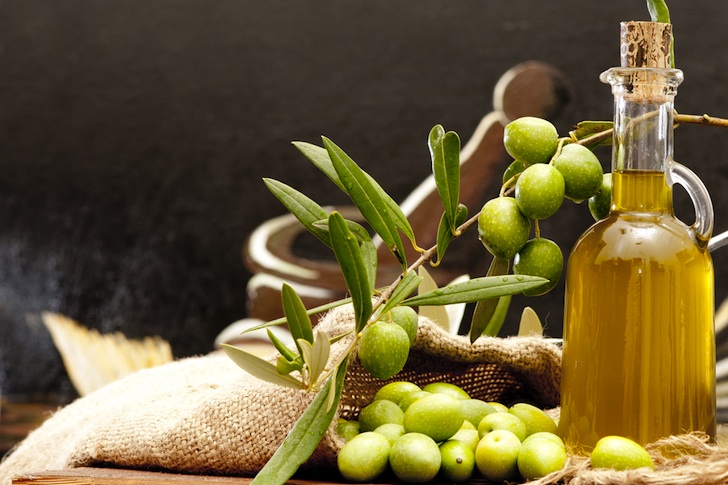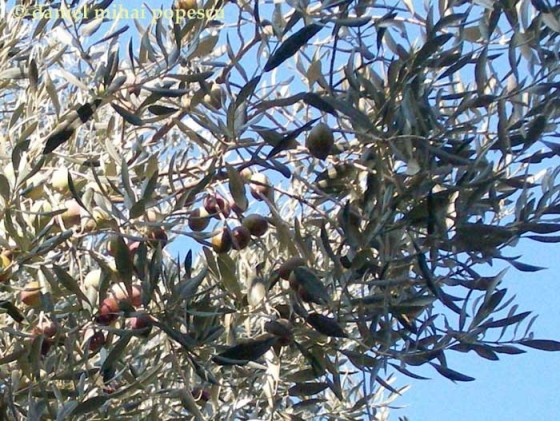I have spent a few important years in Turkey. The rural population consider it an important olive oil producer and exporter. Fortunately, the villagers who own olive trees, have also virgin olive oil. Unfortunately, one cannot find in supermarkets something remotely closer even to that, because what is sold for the rest of Turkey, is obviously refined. Actually a very few know for real, because it can be sometimes a physical impossibility to tell the difference while not having comparison items.
[source]
So, the olive tree owners, pick up the olives after beating them down from the tree with sticks. They collect them and they let them layered in their courtyards, for a few days, to dehydrate a little bit. They put them in bags, and went to the press, wherever they have a connection. Some of these guys are really entrepreneurs and even transport the olive bags for their neighbors, collecting a commission for fidelity from the press owner. They pay in olive oil percents, or, rarely with theoretical money, meaning with a promise of money. Sometimes they keep their promise next season, when they pay in “nature”, leaving to the press the usual 10% from the total quantity, doubled this time. Who looses? The peasant. He wanted to have more oil for himself, so, he didn’t pay in the first year, hoping that the next will be better and the difference wouldn’t count. They throw things and barks a little, and everything will be all right, no one looses face.
They are convinced that the oil is extra virgin, not really knowing to tell the difference between virgin and extra virgin. In antiquity, the olives were crushed in stone presses. The result was a tasty extra virgin oil, tasty because the seeds were kept together. The seeds are the ones that give the strong olive taste. A quality extra virgin olive oil is the oil obtained without any heating or chemical treatment, by pressing seedless olive fruits. I think that the seeds are what make the difference between virgin and extra virgin. By the way, the extra virgin oil is almost tasteless, but may have a slight aroma. You may test it by putting a tea spoon in a tea glass, covering the glass with one palm and warming it with the other, shaking it in circular movements, to make the oil to stick on the glass walls. After a minute or two, you may sniff the glass. The aroma released is almost unique for any certain orchard. Sip it without swallowing, and roll it around in your mouth for a few seconds. After that, you have to spit it out and wait another few seconds. An extra virgin oil of a good quality will let no after taste. If you feel any taste, a pungency or other “strange” sensation, it has been made from whole olives, or even from pomace. Pomace oil, is extracted with solvents from the pulp left after the first extraction. The result is blended with some virgin oil for the taste and sold as “Pure Olive Oil”.
The poor guys are told that their oil is the best in the world, and Turkey is the Number One Olive Oil producer in the world, as the olives are growing even on the peaks of Ararat Mountains. Little they know that extra virgin oil, has never been extracted with their local presses. There, the olives are shredded into a paste which is mixed with water and some solvents, of course not in a significant quantity to be detected by taste, but to increase the quantity of extracted oil. Usually, without solvents, up to 10% remain in the pomace. After that, the press owner (it is improper to call it press, because the method is based on using centrifugal separators to extract the oil by separating it from the olive paste, water helping to the momentum), sell the pomace (almost for nothing), to the big brand factories in Izmir, which fill up the advertising spots with images of “pure virgin oil, from the heart of the Turkish land, extracted with love from olives maturated under the Turkish sun”.
[source]
I have had a contract once, being an engineer on a little Greek tanker specialized in transporting edible oil. I know a lot of the process, even with the big factory brands’ perspective. The Americans are sure that they buy Italian olive oil, but they don’t know that the oil came from Tunisia, Syria and Turkey, as well as from Italy, which buys olive oil from Tunisia, Syria, Spain, turkey and Greece, who buys from Tunisia, Syria and Turkey. So, the Turkish peasants involuntarily may have a point, but the statistics (on paper) shows that Spain is the bigger and greater producer of olive oil in the world, not Turkey or the descendants of Don Vito Corleone. The Italian Olive Oil is like the Chianti wine, you have it in all the kitchen in the world, on all the tables in the world. And still, in a Mediterranean Turkish village, you can taste a good virgin olive oil, especially if you have good connections.
If you liked what you read (and for that I humbly thank you for your patience), subscribe to this blog by Email! Follow this blog on Twitter, and on Facebook! For a joyous day, check out my pins on Pinterest or my grams on Instagram 😄. I hope you like this blog so much that you think it’s time to take a step further by becoming yourself a blogger; in order to do that have the kindness to read the Own Your Website offer I have prepared for you! You won’t regret. Thanks for passing by 😄 Speak your mind, don’t be shy!
Copyright © 2014 Rodolfo Grimaldi Blog – About Olive Oil, an Ingredient for Life



